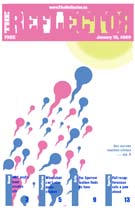| |

Professor under fire |
| Controversial book on ‘aboriginal industry’ draws criticism |
by Alan Mattson |
| |
After writing a controversial new book, Mount Royal College professor Frances Widdowson is facing fierce criticism and calls for her dismissal.
In Disrobing the Aboriginal Industry, Widdowson and co-author Albert Howard argue that “parasitic” non-aboriginals
(such as lawyers or consultants)
make huge profits from government-funded programs while aboriginals themselves suffer.
According to the book, this “aboriginal industry” manipulates
(or bribes) native leaders
into helping maintain the status quo, ensuring that the money will keep flowing.
Harsh criticism for the book and its authors has flowed in from within Mount Royal, other scholars, aboriginal leaders
and those who believe the book’s views are dangerous and outdated. |
| |
READ FULL STORY |
Cigarette ban hits MRC |
| Collegiate Shop worries it could see huge losses |
by Melissa Welsh |
| |
Mount Royal students may have to trek farther distances to buy cigarettes now that the Tobacco Reduction Act prohibits
any tobacco products from being sold at the college.
The new regulations were first initiated last January when smoking was outlawed in all public places and workplaces. Then on July 1 the advertising or promotion of tobacco products
was banned at all retail locations. The final step on Jan. 1 was to prohibit the sale of all tobacco products at post-secondary
institutions, pharmacies
and retail outlets including a pharmacy.
“By taking the cigarettes off campus we’re promoting health and wellness,” said Shermin Murji, 26, a tobacco reduction
educator at the EnCana Wellness Centre at Mount Royal.
With such clear-cut regulations,
the Tobacco Reduction Act is causing concern for merchandisers
who depend on the profit that tobacco brings in. |
| |
READ FULL STORY |
Aboriginal cultural gap a reality |
— Frances Widdowson and Albert Howard
Frances Widdowson is a professor in the Department of Policy Studies at Mount Royal College. Albert Howard has worked as a consultant for government and native
groups, and is currently an instructor and Director of Programs at the Kennedy College of Technology in Toronto. |
|
At the forum we were hoping to provide
an overview of our arguments in Disrobing the Aboriginal Industry: The Deception Behind Indigenous Cultural Preservation. We were looking forward to scholarly criticisms from Dr. James Frideres and Dr. Eldon Yellowhorn so as to further clarify our position.
Unfortunately, however, Yellowhorn and Frideres chose instead to showboat their own questionable opinions, such as the importance of “turtle island” mythology
for understanding human origins, the idea that stampeding bison over cliffs reflects
an aboriginal ecological consciousness,
and the irrelevant assertion that native languages are “verb based” rather than “noun based.”
The lack of scholarly engagement was especially
prevalent in the case of Frideres, who elected to focus
on matters
of form: the book’s subheadings were “too cute” and we did not capitalize the adjectives “aboriginal” or “native.” More disturbingly, Frideres attacked our research with the false accusation
that most of our references relied on sources like the Globe and Mail and Chatelaine (our book actually contains 59 references to the Globe and Mail and only one reference to Chatelaine out of 851 endnotes, most of which involve scholarly
sources). These disingenuous tactics reflect the paucity of intellectual opposition
to our views. |
| |
READ FULL STORY |
Authors use ‘flimsy knowledge’ |
— Jim Frideres
Jim Frideres is chair of ethnic studies and director of international indigenous studies at the University of Calgary. |
|
Writing a book on the “Aboriginal industry” is certainly a worthy and important
undertaking. There are lots of “industries” out there in the real world, such as cancer, diabetes, “green,” subsidization,
immigration, and to situate the case of Aboriginal people within this industry context would certainly be an important practical and theoretical contribution to both the academy and policy makers or analysts.
However, without comparative information,
one cannot really assess any one single case. Just because you find the budget for an “industry” is $8.9 million doesn’t allow you to say if this is high, low or medium in expenditures.
Only when you find out that another
industry such as the “subsidization
business” has an expenditure of $14.9 billion can you then make as statement as to whether or not the original case study allocation is low. Here lies a fundamental
problem of the book. There is no comparative data presented by which to evaluate the “Aboriginal Industry.” |
| |
READ FULL STORY |
|
|


